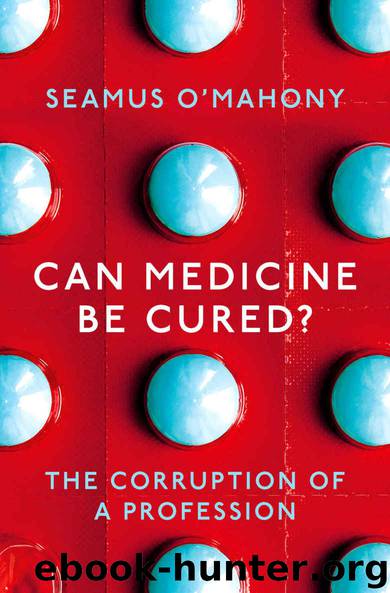Can Medicine Be Cured by Seamus O'Mahony

Author:Seamus O'Mahony [O'Mahony, Seamus]
Language: eng
Format: epub
ISBN: 9781788544542
Publisher: Head of Zeus
Published: 2019-02-06T22:00:00+00:00
10
Quantified, Digitized and for Sale
The American rich can now access a new type of hyper-consumerist health care, a model they present to the rest of the world as how medicine really should be. The biotechnology entrepreneur Craig Venter is in the vanguard of this movement. He is most famous for the bitterly contested race his company, Celera, fought against the publicly funded consortium headed by Francis Collins to be the first to map the human genome. Venter was later sacked by Celera, and now heads a venture called Human Longevity, Inc.™ (HLI). He has set up a clinic, the Health Nucleus, where, for $25,000, you can have your genome and microbiome (the bugs in your gut) characterized, along with a total body MRI, bone-density scanning, hundreds of blood tests, analysis of cognitive function, and so on. Google’s director of engineering, Ray Kurzweil, who believes in a future where humans will become immortal, is one of HLI’s advisors. Although Venter is planning to expand HLI’s customer base, for the moment the market is the wealthy, for whom the promise of health is ‘the ultimate luxury item’. HLI is slowly building a database from these rich consumers, linking their fully sequenced genomes with all the other phenotypic and clinical data gathered by the $25,000 ‘physical’. Venter, whose long-term plan is to sell these data to pharmaceutical and insurance companies and health-care providers, is admired as a pioneer of ‘digital health’.
Digital health, also known by a slew of catchy phrases such as ‘E-medicine’, ‘eHealth’, ‘Medicine 2.0’, ‘iMedicine’ and ‘Health 2.0’, is an umbrella term used to describe a number of new technology-driven developments in medicine. These include the use of biosensors to monitor health, tele-medicine – carrying out medical consultations via digital media, the digitization of individuals’ genomes, and the use of social media to create ‘communities’ of patients. Digital health appeals mainly to those who need health care the least: the young and the rich. It is driven by a new cadre of techno-utopians, who proclaim themselves as ‘creative disrupters’ of the old order. Enthusiasts argue that digital health will empower the patient, end the traditional patriarchalism of the medical profession and drive down the costs of health care. There is political support for digital health: the US Affordable Care Act (‘Obamacare’) promotes tele-consultations and patient self-monitoring. The surgeon and former junior health minister Lord Ara Darzi, in his 2018 report on NHS funding, warns that ‘having grown up in the age of the Internet, artificial intelligence and Big Data they [the next generation] will not stand for an analogue health and care service.’ Darzi is particularly entranced by the ‘convergence revolution’, a phrase which emerged from the Massachusetts Institute of Technology (MIT) in 2011, and which modestly announced itself as ‘the third revolution in life sciences’. A 2016 report from MIT claims that ‘truly major advances in the fight against cancer, dementia and diseases of aging, still rampant infectious disease, and a host of other pressing health challenges will only come
Download
This site does not store any files on its server. We only index and link to content provided by other sites. Please contact the content providers to delete copyright contents if any and email us, we'll remove relevant links or contents immediately.
| Administration & Medicine Economics | Allied Health Professions |
| Basic Sciences | Dentistry |
| History | Medical Informatics |
| Medicine | Nursing |
| Pharmacology | Psychology |
| Research | Veterinary Medicine |
The Immortal Life of Henrietta Lacks by Rebecca Skloot(4567)
An American Plague by Jim Murphy(3751)
The Emperor of All Maladies: A Biography of Cancer by Siddhartha Mukherjee(3135)
The Gene: An Intimate History by Siddhartha Mukherjee(3086)
The Fate of Rome: Climate, Disease, and the End of an Empire (The Princeton History of the Ancient World) by Kyle Harper(3049)
Rebecca Skloot by The Immortal Life of Henrietta Lacks(1996)
Stiff - The Curious Lives of Human Cadavers by Mary Roach(1844)
The Great Influenza by John M Barry(1773)
The Vaccine Race by Meredith Wadman(1647)
Hero by Michael Grant(1638)
Undue Risk by Moreno Jonathan D.;(1620)
Three Cups of Tea by Greg Mortenson(1606)
The Mystery of the Exploding Teeth by Thomas Morris(1559)
Quackery by Lydia Kang(1545)
Autism's False Prophets by Paul A. Offit(1530)
Extremes: Life, Death and the Limits of the Human Body by Fong Kevin(1515)
A Journal of the Plague Year (Oxford World's Classics) by Daniel Defoe(1509)
Steroids: History, Science, and Issues by Standora Joan E.; Bogomolnik Alex; Slugocki Malgorzata(1506)
The Vaccine Court by Rohde Wayne(1494)
